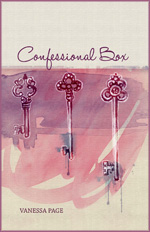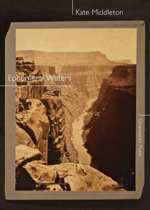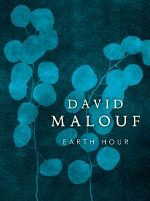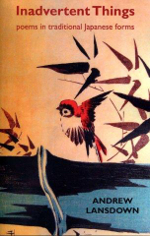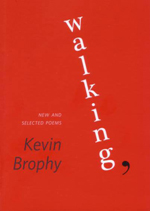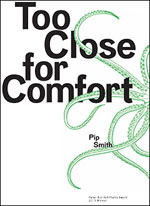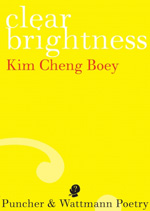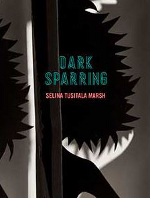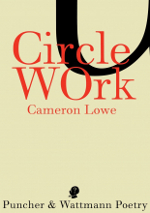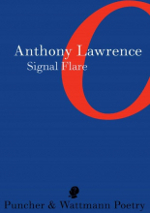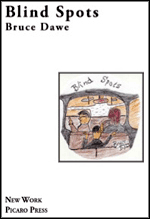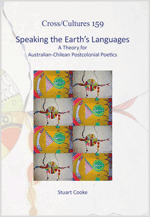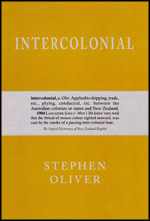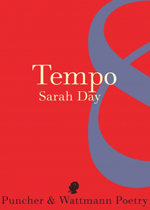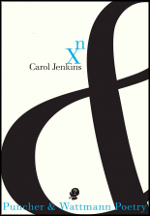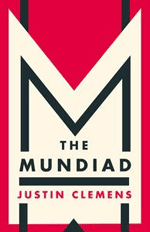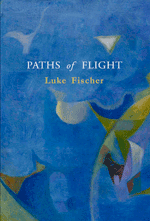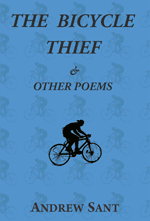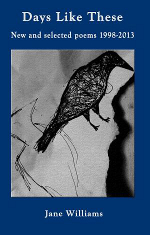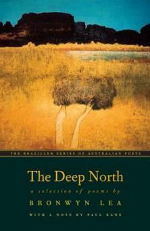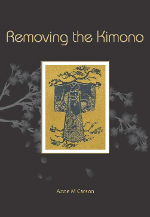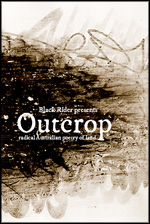BOOK REVIEWS
Review Short: Vanessa Page’s Confessional Box
Australian poet Vanessa Page’s latest collection, Confessional Box, is equal parts personal and critical, examining emotional relationships with a terse, engaging style. As the title suggests, there is a strongly self-aware element to Confessional Box. The poems are relatively open, encompassing a range of points of view and personas, but these are not wholly simple reflections of human relationships. Rather, Page presents a series of evolving sections, embellishing on memories and balancing broader criticisms against more personally orientated notions of access and invitation.
Libby Hart Reviews Kate Middleton
For her second poetry collection Ephemeral waters, award-winning poet Kate Middleton followed the course of the Colorado River. The Colorado’s 2,330km journey begins in Rocky Mountain National Park.
Review Short: David Malouf’s Earth Hour
It is a delight to have, after seven years, a new collection of poems from David Malouf who remains, in his ever-modest way, one of the central figures in Australian writing. As a poet, he glimpses the big currents, but is constantly alert to the tiny epiphanies of dailiness, as when he evokes ‘Shy gifts that come to us from a world that may not/ even know that we are here. Windfalls, scantlings.’
Review Short: Andrew Lansdown’s Inadvertent Things – Poems in traditional Japanese forms
Andrew Lansdown’s poetry has long been defined by the primacy of the image and a preoccupation with form. Inadvertent Things revisits the themes of nature, family and God through the familiar Japanese forms of tanka and haiku, and also the choka, a sort of extended tanka. The haiku is the form that features most often and always as part of a suite called a gunsaku, where the poems work independently but also cumulatively. All the terms are explained in a short introduction for the uninitiated, in which Lansdown expresses his intention to follow the spirit rather than the letter of the law.
Review Short: Kevin Brophy’s Walking,
Poetry collections aren’t prone to extensive reprints, so Kevin Brophy’s Walking, – which includes selections from five previous books – is somewhat of a trove for anyone wanting to access his earlier work. It also features a suite of new poems which, in their gentle complexity, are among his most interesting – testimony to a writer who’s carefully honed his craft over a 30-year stretch.
Review Short: Pip Smith’s Too Close for Comfort
It’s funny the effect of sequence. When I picked up Pip Smith’s collection Too Close for Comfort, winner of the 2013 Helen Bell Poetry Award, I wasn’t primed for anything. I had no expectations – neither indulgent, nor prickly. The volume has texture: bundles of thin pages alternating with thick ones, the latter offering various portions of an illustration of the work’s ‘leitmotif’ – the giant squid.
Kate Middleton Reviews Kim Cheng Boey
With Clear Brightness Kim Cheng Boey offers a slim volume that, in addition to addressing notions of place, exile and travel, carries with it a deep melancholy of being written in ‘the lone wastes of middle age’. His explorations of worldliness are welcome, and Boey offers portraits of interconnectedness even as he displays and explores alienation. Moving from markets to Chinatowns, from Singapore’s National Theatre to California’s Santa Barbara, this collection often shows the objects that connect the past to the present, keepsakes available to keepers and gleaners alike.
Review Short: Selina Tusitala Marsh’s Dark Sparring
The first epigraph to Selina Tusitala Marsh’s new collection is from Muhammad Ali; ‘The fight,’ he says, ‘is won or lost far away from witnesses – behind the lines … long before I dance under these lights’. Behind Tusitala Marsh’s lines of poetry, there is an immense reserve of strength and grace, enough to sustain the poet through her mother’s death from cancer and to channel her fear and anger into rhythms of the Muay Thai kickboxing ring and the page.
Review Short: Cameron Lowe’s Circle Work
The poems in Cameron Lowe’s Circle Work swing across each page at a strangely measured, athletic tilt. The scope is local and vast, the gaze muscular, and Lowe sweeps the vistas (from Corio to the universe) for details apprehended as preternatural. His rapture typified in the lines, ‘the body’s cruel admission// that close is never close enough’ (56), these poems skirt edges of realness without entering the domain of things. Lowe’s is a poetics of evanescence, not arrival, and Circle Work frames the contours of human habitats as noise-filled within <
Review Short: Anthony Lawrence’s Signal Flare
Some months back, I ended up sitting next to a fairly eccentric white-bearded bloke on a Sydney bus. Upon hearing I was an Australian poetry researcher, my new acquaintance exclaimed ‘Australian poetry!’ with obvious distaste, followed by ‘Fu–ing Anthony Lawrence!’ He went on to detail how feral Aussie upstarts like Lawrence and ‘bloody Adamson’ were bastardising the great tradition of English Romanticism. As he rose to hop off, I asked for his name. He cheerfully declined.
Andrew Fuhrmann Reviews Bruce Dawe’s Plays in Verse: Kevin Almighty and Blind Spots
Some poets are sublime and ridiculous at the same time. James Kenneth Stephen was only being felicitously expressive of what oft was thought of Wordsworth when he wrote:
Two voices are there: one is of the deep; It learns the storm-cloud’s thunderous melody, Now roars, now murmurs with the changing sea, Now bird-like pipes, now closes soft in sleep: And one is of an old half-witted sheep Which bleats articulate monotony, And indicates that two and one are three, That grass is green, lakes damp, and mountains steep And, Wordsworth, both are thine ...
Nicholas Birns Reviews Contemporary Russian Poetry: An Anthology
Dalkey Archive Press has long been known as a premier publisher of cutting-edge international fiction; here the Illinois-based firm continues its venture into poetry. This massive book, including forty-four poets, all with English translations facing their Russian originals, and supervised by both an ‘editor’ and a ‘translation editor’, is an anthology of Russian poetry written by living poets, or those born late enough to still be plausibly alive today. It is not, in other words, just inclusive of the latest generation, or those explicitly linked to postmodern or experimental practices; or those coming to prominence only after the dissolution of the Soviet Union in 1991.
Nicholas Jose Reviews Speaking the Earth’s Languages: A Theory for Australian-Chilean Postcolonial Poetics
If poetry registers ‘internal difference, Where the Meanings, are’, in Emily Dickinson’s deep phrase, then indigenous poetry creates meanings that are more different still. Growing from an alternative poetics that questions conventional procedures and challenges what we know, indigenous poetry gives us a chance to change. That is true whoever or wherever we are, Indigenous, indigenous or invited in. It may be more broadly true, across other art forms too, but to start from poetry, if poetic language is speech at its most highly charged, then in indigenous poetry there’s a glimpse of a potential for overturning and renewal. Dominant practice has its own built-in obsolescence. Paradoxically, given its acknowledgement of the timelessly old and absent, indigenous poetry suggests a new way forward.
Review Short: Stephen Oliver’s Intercolonial
Intercolonial, a new book-length poem by Stephen Oliver, focuses its attention on New Zealand, Australia, and the sea that lies between them. With sweeping long lines, Stephen Oliver zooms in on the details of place and geology: the poem is full of cinematic pans over landscape, seascape and human history, fulfilling what is often a purview of the long poem in naming the world and its inhabitants.
Review Short: Sarah Day’s Tempo
There is much poetry about currently which does not value rhythm and music as integral to its sense. Day’s poetry absolutely does; filled with assonance and internal rhyme which renders many individual lines beautiful and suggestive. The first poem, ‘El Iskandariya’ is one of the best, capturing a moment without labouring it:
When marsh birds pooled out of the sky like ink on water to devour the barley flour that Alexander’s men had laid to mark the city’s boundaries, the hour seemed lost beyond recall ... (p. 1)
Review Short: Carol Jenkins’s Xn
Xn has been described as a ‘mathematical metaphor for poetry’ and Carol Jenkins as a science-poet, but these are misleading claims. Jenkins’s vocabulary may derive from the sciences, but her themes are firmly grounded in the domestic. From the cosmic to the most mundane, nothing is beneath her scrutiny:
nothing is too large to think into being or too small to overlook once I turn my mind that way, such as this pen the poem and even you.
Mathew Abbott Reviews Justin Clemens
What was mock epic? I use the past tense because the genre is thought to have died in the nineteenth century. According to a recent study by Professor Ritchie Robertson, a Queen’s College fellow and Taylor Professor of the German Language and Literature at Oxford University, mock epic died because epic lost its authoritative status: it was only possible to write a real mock epic in a time ‘when serious epics were being written and read in large numbers, manag[ing] to attain a position of cultural authority remotely comparable to that of Homer, Virgil, or Milton.’ Mock epic needed something prestigious to mock; when the epic lost its prestige mock epic lost its reason for being.
Review Short: Luke Fischer’s Paths of Flight
In Shakespeare’s last great poem, The Phoenix and the Turtle, the owl is banished from the allegorical proceedings of the bird funeral:
But thou, shrieking harbinger, Foul pre-currer of the fiend, Augur of the fever's end, To this troop come thou not near
Review Short: Andrew Sant’s The Bicycle Thief & Other Poems
It’s no current reference, but reading Andrew Sant’s recent collection, The Bicycle Thief, Andrew McGahan’s Praise springs to mind. When I studied McGahan’s novel, a more astute student than I pointed out that Gordon’s only romantic relationship was with his car, and that, accordingly, his only romantic response was towards the sad demise of that Holden.
Review Short: Jane Williams’s Days Like These: New and Selected Poems 1998-2013
Days Like These: New and Selected Poems 1998-2013, by Jane Williams, includes new work and selections from Outside Temple Boundaries (1998), The Last Tourist (2006) (both published with Five Islands Press), Begging the Question (2008) from Ginninderra Press and City of Possibilities (2011) from Interactive Press. It’s always a pleasure to discover the writings of a poet who you have not read before. In Days Like These Jane Williams delivers poetry that wants to feel the ‘pulse of every living thing’; she is a writer sensitive to the world.
Maria Takolander Reviews Bronwyn Lea
It is a tribute to the quality and readability of Bronwyn Lea’s poetry that a selection of her work forms the second volume in the new George Braziller series (edited by Paul Kane), which aims to introduce contemporary Australian poets to American readers. True to lyric poetry, Lea’s poems are musical in their composition, and they can be intimate in their subject matter. However, Lea’s work is never just about crafting agreeable verse, and it is never just about her personal experience.
Review Short: Anne M. Carson’s Removing the Kimono
Every poem in Anne M. Carson’s collection is appealing on account of the distinctive cast of mind revealed in a precise language that registers the author’s alertness to all senses. Three groups of poems establish a pattern of mortality and rebirth, of natural forces and human emotions.
Review Short: Outcrop: radical Australian poetry of land
As I write this review, sunlight filtered through a pall of smoke casts a dull orange glow over my kitchen bench. The Blue Mountains are burning. Sydney’s haze resembles downtown Beijing’s and it’s only October. Such an apocalyptic scene – part of the ‘Australian experience’ I am assured by our Prime Minister – provides context for the world into which Outcrop and its ‘radical poetry of land’ emerges. This is not to suggest that the anthology’s outlook is primarily environmental, but that alternative ways of examining land are sorely needed.
Timothy Yu Reviews Contemporary Asian Australian Poets
A decade ago, Cordite Poetry Review asked me to write a review of its tenth issue, ‘Location: Asia-Australia.’ In my review, I wrote that while the issue did a splendid job of showing the intersection between two separate places called ‘Asia’ and ‘Australia,’ it was less clear whether the ‘Asian-Australian’ could also be a thing unto itself, a kind of writing that might be visible within domestic as well as international spaces.

